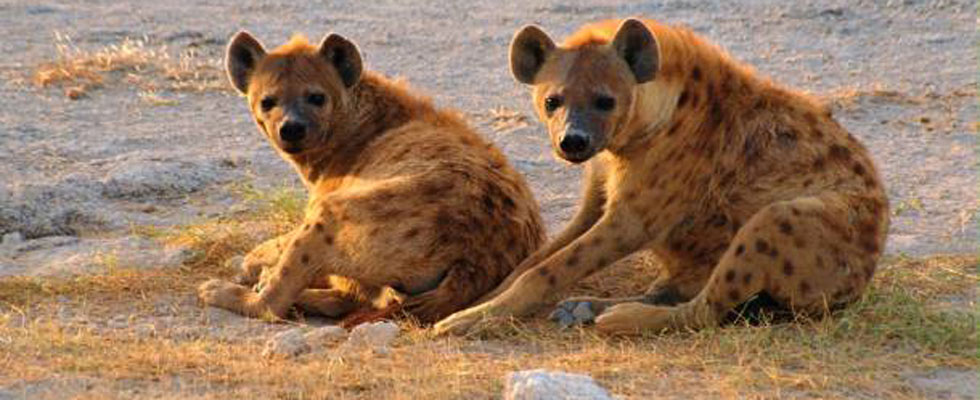
BOREHOLES have dried up and food is hard to find in Munyikwa communal area in Gutu district. The Standard, deputy Editor Walter Marwizi travelled to Matombo village, almost 400km from Harare last week and heard harrowing tales of people locked in fierce survival battles with wild animals.
Report by Walter Marwizi,Deputy Editor
MATOMBO — It’s not a conversation of the faint-hearted as the old man sitting next to me talks animatedly about how he survived a pre-dawn raid by hyenas near Nyuni mountain range three weeks ago.
“It was around 4 o’clock in the morning and I was going to board a bus to Gutu. They had stalked me for about 2km and thought I had fallen when I tried to cross a gully. They rushed towards me hoping for a kill, but to their surprise, I was still on my two feet,”said the old man who is in his late 50s.
“It was close, I could smell their breath when they retreated a few inches away. I almost fainted.”
Two more people narrate similar harrowing stories, turning our conversation at a funeral of a loved one into a frightening tale of predators hunting for human prey. Just two years ago, such a conversation about hyenas preying on adults would have been dismissed as fiction.
With forests fast disappearing, the few hyenas that managed to survive in this drought ravaged area were confined to mountain-tops. Their cackling laugh-like screams, often heard at night, were the only thing that reminded villagers of their presence.
But these days in the communal area which shares its boundary with Buhera, hyenas (mapere) are now a common subject for grey haired men partaking Seven Days, a homemade brew.
- Chamisa under fire over US$120K donation
- Mavhunga puts DeMbare into Chibuku quarterfinals
- Pension funds bet on Cabora Bassa oilfields
- Councils defy govt fire tender directive
Keep Reading
The predators have struck fear in the hearts of villagers who now have to exercise caution when they travel at night. Some now move around with axes or knobkerries.
Word spreads fast in villages. Everyone is aware that the deadly animals attacked children in nearby Mutiusinazita, about 20km away. Buhera South MP, Joseph Chinotimba took the matter to parliament, prompting rangers to declare war on the predators.
But nothing of that sort has happened in Munyikwa and elders fear that a disaster is waiting to happen unless authorities take some action.
The hyenas target people who want to board buses early in the morning and sometimes stalk them for long distances hoping for a chance to strike.
Hiding behind bushes that grow near narrow footpaths, they also take a keen interest on the movements of drunkards who stagger at night while on their way home.
Conversing with villagers, I learnt that the problem started two years ago after a telecommunications company installed a base station on top of Rasa mountain.
The mountain, which is about 50km away along the dust road to Mpandawana growth point, is the biggest in the district and has traditionally been a safe haven for wild animals.
“When the Chinese contracted to set up the base station blasted rocks with dynamite, the hyenas fled Rasa. They sought sanctuary down here, but it’s hot and dry they can’t survive in Munyikwa unless they kill our cattle, goats and chickens. It’s not easy, so they end up targeting us,” the old man said.
It is however, not just these predators that are leaving the mountains and getting into direct conflict with human beings.
Monkey and baboons, facing starvations in their mountain sanctuaries, are now a common feature at people’s homesteads. They leave the hilltops in large numbers and descend on homesteads where they break into homes and grab anything they can eat.
At Baro Shopping Centre in Makura village, two mango trees have become hunting ground for the animals that come from Changwara mountain, which is about 200m away.
The baboons and monkeys scale the fence that has been fortified with thorns and raid the fruit trees in broad daylight, just three metres from a kitchen. If they encounter small boys and girls guarding the trees, they beat them up mercilessly.
Since I wanted to take some mangoes to Harare for my wife and children, I was advised to guard the fruit trees. Sleeping under a mango tree, shielded from the searing Munyikwa sun, wasn’t any unpleasant task as it gave me an opportunity to rest.
It however, never dawned on me that behind the fence about 10 metres away, a troop of baboons was patiently watching my movements.
They pounced in a semi military formation when I left the mango tree briefly to stretch my legs. The marauding baboons, some with skinny babies tucked under their bellies, quickly colonised the two trees, and feasted on the mangoes.
I got a fright when I returned to see that the animals had taken over. A big baboon was sitting on a chair making faces. They only ran away when I smashed a brick on its ugly face.
Angry and disappointed, I had the unpleasant task of cleaning the excretion left on the seat and to pick up the few unripe mangoes left.
Such is the life in Munyikwa communal area, the land of my birth gripped by a crippling drought.











